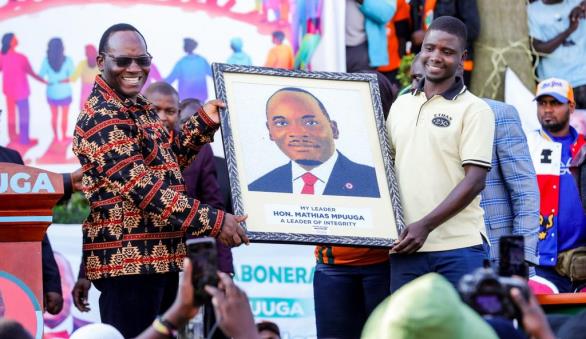Check also: United States to reconsider its relationship with Uganda
A protester at the United Nations in New York mourned the dismantling of cooperatives. Others simply want the electoral victory of their candidate Besigye to be upheld. Refugee LGBTI Ugandans have brought their own messages on placards to strategic places, like Ugandan embassies and other points of international diplomacy and influence. The common thread these diaspora members share is their disdain for Museveni’s military coup.
Ugandans abroad called for Canadian, American and European governments to place travel bans on Museveni and his key allies, such as ruling party secretary general Kasule Lumumba (who threatened to open fire on protesters contesting election results weeks before the actual voting day), Kale Kayihura and Katumba Wamala (both vicious security operatives trained by the United States).
Diaspora members also leveraged their influence in the sphere of performing arts. Bebe Cool, one of the musicians featured in Museveni’s campaign theme song “Tubonga Nawe,” was pressured by Ugandans living in Dubai to leave the stage. Many Ugandans in the diaspora heeded the call of the Forum for Democratic Change opposition party to boycott performances of artists aligned with the regime.
Milton Allimadi, editor for Black Star News, wrote an open letter to President Barack Obama that said, “In whichever country they reside, Ugandans should make it clear that the international community can’t continue business as usual with an illegitimate ruler. The United States, Uganda’s principal sponsor, is even barred by the Leahy amendment from working with the Museveni regime whose army has been used for violent repression.” A group of Ugandans residing in America are exploring the possibility of suing the Obama administration for continued illegal military relations with Museveni.
The U.S. government
The United States is Uganda’s largest bilateral funder, annually offering hundreds of millions of dollars in known military financial support alone. The United States also places heavy investments in Uganda’s health sector, much of which is ultimately embezzled. Museveni’s anti-terrorism rhetoric and neoliberal policies have long captured the support of the western powers.
For this reason, it was rather shocking that the U.S. Embassy of Kampala denounced Museveni’s use of security forces to repress Ugandans before and during voting day. It was probably the strongest human rights statements Ugandans could have received from a foreign diplomatic mission. Nevertheless, the United States in keeping with its support of the Musevini regime was quick to recognize the Supreme Court’s ruling on the fairness of the election. What’s more, newly-appointed U.S. Ambassador Deborah R. Malac submitted her credentials to Museveni just days after the election, symbolically recognizing him as head of state, this despite the fact that she condemned Uganda’s government for human rights abuses upon first stepping foot in the country.
While it would be easy to draw conclusions about her mixed support for Museveni given her position representing what is arguably the largest military relationship in Africa, the truth is that the United States isn’t alone. According to Muhindo, the aforementioned organizer who attempted to meet with UNHCR staff, “The world outside of Uganda legitimizes the dictatorship through its funding and support.”
Perceived roles of external actors
There are many international agencies, NGOs and Ugandan citizens raising their alarms, but there also seems to be little communication between various stakeholders to ascertain which institutions play which roles in times of violence and political upheaval.
There are efforts underway to map this complex terrain. The Atlantic Council, Open Society Foundation and Rhize have partnered with activists in Uganda, Sudan and 10 other countries around the world currently in conflict in order to collect views on the roles of outside supporters in relation to those struggling to cultivate democracy through social change movements. While the data has not yet been fully collected and analyzed, it may produce some quantitative and qualitative insights to inform institutions in Washington, D.C. and elsewhere what others are expecting from them.
One thing is clear, however: Superpowers usually like to be on the side of the winning team. Therefore, external actors might not play the roles they are mandated to play unless they witness massive in-country support for those striving to change the system. For the time being, Ugandans should probably expect less from foreign governments and more from their diaspora members who, though constrained by numbers and resources, have a personal stake in the struggle.
Source: wagingnonviolence
Check also; Cancer patients in Uganda to wait for 2 years
To break or to build: which way will Uganda’s opposition turn
Uganda court confirms Museveni’s re-election
This is not a Paywall, but Newslex Point's journalism consumes a lot of time, hard-work and money. That's why we're kindly requesting you to support us in anyway they can, for as little as $1 or more, you can support us .
Please use the button below to contribute to Newslex Point, Inc. using a credit card or via PayPal.

 Newslex Point News in Uganda, Uganda news
Newslex Point News in Uganda, Uganda news












